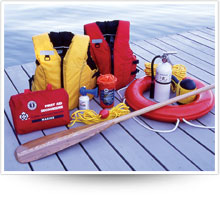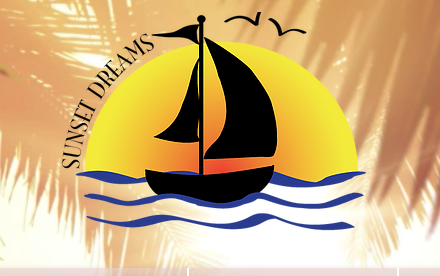by Ron Gorka
Most boaters are well aware of the equipment and safety regulations established by the US Coastguard and State Law. Although most boats are properly equipped when initially purchased, it pays to do a safety check, at least on an annual basis, to assure compliance with state and federal regulations and provide peace of mind, knowing that you have done your best to protect yourself and your passengers. Due to changing regulations and loss and deterioration of equipment, few boaters can complete a thorough safety check without discovering deficiencies.
Here’s a quick check list of safety gear requirements for a small vessel (16 to less than 26 feet):
· A Type I, II or III device for each person on board, plus one throwable Type IV device. Note: Every person on board age 6 or under must wear their flotation device while the vessel is under way. Make sure each device is in good serviceable condition, including all straps etc.
· One USCG approved B-1 type Fire Extinguisher. If your boat is powered and under 26’, has a built-in fuel tank, an inboard engine or a compartment where portable fuel tanks may be stored, you must carry a fire extinguisher.
· A Visual Distress Signal (on the high sea or in coastal waters only).
· A Sound Producing Device: Bell, Horn, Whistle etc.

Having the equipment aboard is not sufficient. Make sure everything is in good working condition and the fire extinguisher is not out of date. In addition to the required equipment, experienced boaters will also equip their boat with an anchor and line, dock lines, a working bilge pump and an oar or paddle – don’t get caught up a creek without one!
Safety regulations extend to navigation lighting. Make sure your red/green bow light is properly installed and in good working order. Many white stern or anchor lights are removable and stored in a compartment on the boat. Are you sure yours is at hand and in good working order? State regulations also require that a copy of your vessel registration is aboard when under way.
Regulations will vary considerably based on size, type and class of vessel. For in-depth information on all classes of vessels, consult myfwc.com FWC.com or the US Coast Guard at uscgboating.org. New boaters and those unfamiliar with boating in coastal waters should take a refresher course in boat handling and navigation. Anyone born on or after January 1, 1988 must have a Boating Safety Education ID Card to legally operate a boat in Florida.
Call me at Sunset Dreams, to get you on the water in a safe vessel! Safe Boating from Sunset Dreams, 5149 Pine Island Road NW at Pine Island Center, 33922, (239) 283-4843
Website: www.sunsetdreams.com Facebook: www.facebook.com/sunsetdreamsfl/

